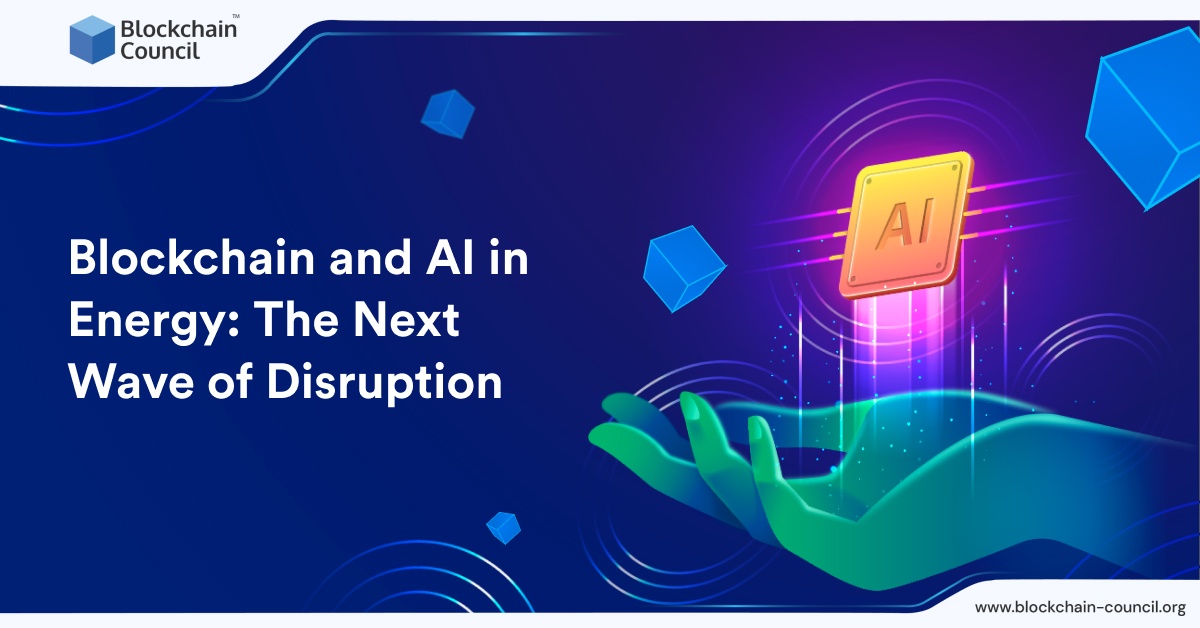Blockchain technology and artificial intelligence (AI) are two breakthrough technologies that have made waves in a variety of sectors in recent years. While each of these technologies can disrupt existing systems and processes on its own. Their combination in the energy industry is producing a tremendous force for change. The merging of blockchain technology and artificial intelligence is set to transform how energy is generated, used, and controlled, ushering in a new era of efficiency, transparency, and decentralization. We further contend that this combination will propel the creation of such autonomous business models, as well as the digital transformation of industrial enterprises.
Role of Blockchain and AI
Blockchain, often associated with cryptocurrencies like Bitcoin, is a decentralized and immutable ledger that enables secure and transparent transactions without the need for intermediaries. AI, on the other hand, refers to the simulation of human intelligence in machines, allowing them to learn, reason, and make decisions autonomously. When these two technologies are brought together in the energy sector, they have the potential to address some of the industry's most pressing challenges.
One of the key areas where blockchain and AI can drive disruption in the energy sector is in the management of energy grids. Traditionally, centralized energy grids have struggled to handle the increasing complexity of integrating renewable energy sources and managing the demand and supply dynamics. By leveraging blockchain's decentralized nature and AI's predictive capabilities, energy grids can become more efficient, resilient, and flexible.
Blockchain can enable the creation of decentralized energy marketplaces, where consumers and prosumers (those who both consume and produce energy) can directly transact with each other. Smart contracts, powered by blockchain technology, can automate and enforce the terms of these transactions, ensuring transparency, security, and trust. AI algorithms can analyze energy consumption patterns and optimize energy trading, matching supply with demand in real time, and reducing wastage.
Moreover, blockchain and AI can facilitate the integration of distributed energy resources (DERs) into the grid. DERs, such as solar panels and wind turbines, generate electricity locally and can feed excess power back into the grid. However, managing the integration of DERs at scale is a complex task. Blockchain-based platforms can enable the secure and transparent tracking of energy generated by DERs. At the same time, AI algorithms can forecast and balance the fluctuating supply from these distributed sources, ensuring grid stability.
Another area where blockchain and AI can drive disruption is in energy supply chain management. Currently, tracking the origin and authenticity of energy resources, such as oil, gas, and minerals, is a challenging and opaque process. By leveraging blockchain's immutable and transparent ledger, it becomes possible to trace the entire lifecycle of energy resources, from extraction to consumption. AI algorithms can analyze this data to detect anomalies, ensure compliance with regulations, and optimize the supply chain for efficiency.
Furthermore, blockchain and AI can enhance energy efficiency by enabling the creation of decentralized energy systems. Traditional energy systems suffer significant transmission and distribution losses, as electricity travels long distances from centralized power plants to end-users. By deploying decentralized energy systems, where energy is generated and consumed locally, these losses can be minimized. AI algorithms can analyze smart meters and sensor data to optimize energy consumption patterns, reducing waste and maximizing efficiency.
In addition to transforming the operational aspects of the energy sector, blockchain and AI can empower consumers to actively participate in the energy market. Blockchain-based platforms can enable the creation of peer-to-peer energy trading networks, where individuals can buy and sell energy directly with each other. AI algorithms can provide personalized energy recommendations and insights, helping consumers make informed decisions about their energy usage and cost optimization.
The convergence of blockchain and AI also opens up opportunities for new business models in the energy sector. For instance, blockchain-based tokens can be used to incentivize the generation and consumption of renewable energy. Energy producers can tokenize their excess energy and sell it to consumers, who can then use these tokens to pay for their energy consumption. This creates a new form of economic exchange that not only promotes renewable energy generation but also empowers individuals to become active participants in the energy market. By tokenizing energy, blockchain technology enables the creation of decentralized energy financing platforms. These platforms can facilitate crowdfunding for renewable energy projects, allowing individuals to invest in clean energy initiatives and share in the financial returns.
Moreover, the combination of blockchain and AI can revolutionize the way energy data is collected, analyzed, and shared. Currently, energy data is fragmented and siloed, making it difficult for stakeholders to access and utilize valuable insights. With blockchain's decentralized and secure ledger, energy data can be stored and shared in a transparent and auditable manner. AI algorithms can then process this data to derive meaningful insights, such as demand patterns, consumption trends, and predictive maintenance requirements.
This enhanced data accessibility and analysis can lead to more informed decision-making and improved energy planning. Utilities can optimize their energy generation and distribution strategies, minimizing costs and reducing their environmental impact. Energy consumers can gain greater visibility into their energy usage, enabling them to make educated choices about energy efficiency and conservation.
Challenges for Blockchain and AI in the energy sector
However, the convergence of blockchain and AI in the energy sector is not without its challenges.
One of the key hurdles is the scalability of blockchain technology. As the number of transactions and data points increases, blockchain networks may face limitations in terms of speed and processing power. Scalability solutions, such as off-chain transactions and layer-two protocols, are being developed to address these challenges and enable the widespread adoption of blockchain in the energy sector.
Another challenge is the interoperability of different blockchain platforms. To fully leverage the potential of blockchain and AI in energy, it is essential to establish standards and protocols that enable seamless data exchange and collaboration across multiple blockchain networks. Industry consortia and collaborative efforts are underway to address these interoperability challenges and promote the development of an interconnected energy ecosystem.
Furthermore, the implementation of blockchain and AI in the energy sector requires collaboration among various stakeholders, including energy companies, regulators, technology providers, and consumers. It is crucial to create a supportive regulatory environment that encourages innovation while ensuring data privacy, security, and compliance. Governments and regulatory bodies play a vital role in fostering an ecosystem that incentivizes the adoption of these disruptive technologies.
Conclusion
The convergence of blockchain and AI in the energy sector holds immense potential to disrupt traditional systems and processes. By enabling decentralized energy marketplaces, optimizing grid management, enhancing supply chain transparency, and empowering consumers, blockchain and AI can drive the next wave of disruption in the energy industry.
However, addressing scalability, interoperability, and regulatory challenges will be key to unlocking the full benefits of these technologies. As the energy sector continues its transition towards a cleaner and more sustainable future, blockchain and AI will play a pivotal role in shaping the energy landscape of tomorrow.
If you want to explore AI and add extra stars to your resume, then Blockchain Council is available for you. Blockchain Council’s newly launched AI certification and cryptocurrency degree programs are extensively designed according to the industry’s demands. Also, these programs offer theoretical and in-field knowledge and are budget-friendly. Scroll through Blockchain Council’s website if you are looking for online blockchain education programs or other related courses.


No comments yet